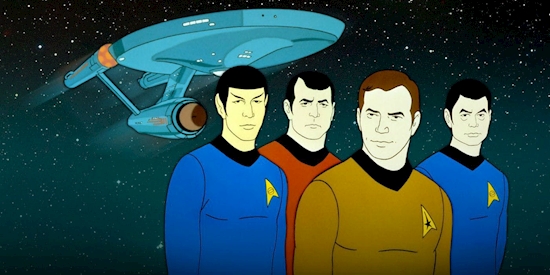Why Star Trek: The Animated Series Isn't Canon
Star Trek: The Animated Series was the first project to capitalize on the success of Star Trek: The Original Series in syndication - so why is its place in canon a point of contention? The answer lies with the franchise's mercurial creator.
By the early '70s, Star Trek reruns were becoming something of a sensation. Many viewers who had never seen the poorly scheduled sci-fi series during its original run on NBC were discovering it for the first time, and the show became a posthumous cultural touchstone. And while it would still be several more years before Star Trek: The Motion Picture brought the crew of the Enterprise back in the flesh, the decision was made to revive Star Trek in animated form in 1973. Series creator Gene Roddenberry returned to oversee the series, and the entire cast of The Original Series - with the exception of Walter Koenig, who ended up writing an episode of the series - returned to voice their characters.
Click the button below to start this article in quick view. Start nowStar Trek: The Animated Series ran for two seasons on NBC, and essentially functioned as a fourth season of The Original Series. The show skewed younger than The Original Series, but was aimed at entertaining all ages rather than just children, which was unusual in that era of television animation. It also featured scripts from The Original Series veterans like D.C. Fontana and David Gerrold, and added some important character development to the series' icons, most notably Spock. Star Trek: The Animated Series also established that the "T." in James T. Kirk stood for "Tiberius" - a fact that would be reaffirmed in the final Original Series film, Star Trek VI: The Undiscovered Country and all projects involving Kirk since.
However, by 1988 Roddenberry's opinion of Star Trek: The Animated Series had soured, and he requested that Paramount remove it from Star Trek's official canon. It's worth noting that in 1988, Roddenberry was in the middle of losing most of his power over the franchise he built; he was no longer involved in the production of the films, and his influence on Star Trek: The Next Generation diminished considerably by that show's third season.
Roddenberry was not shy about his bitterness, even referring to the William Shatner directed Star Trek V: The Final Frontier as being apocryphal - essentially so embarrassingly bad it should be struck from canon. Roddenberry may have had a point about the dismal The Final Frontier, but his dismissal of Star Trek: The Animated Series seemed more like a power move than anything creatively motivated.
Indeed, later Star Trek writers and producers would directly reference events that occurred in The Animated Series, perhaps most notably "Yesteryear," an episode that offered unprecedented insight into Spock's childhood that would have reverberations all the way up to Star Trek: Discovery. Ronald D. Moore - who wrote many of the best episodes of both The Next Generation and Star Trek: Deep Space Nine, two of the The Next Generation movies, and later revived fellow science fiction icon Battlestar Galactica - considers The Animated Series to be canon, and referenced the show whenever he could.
While Paramount abided by Roddenberry's wishes, current rights holder CBS hasn't made an official announcement on Star Trek: The Animated Series' place in canon, though they are developing their own animated Star Trek projects, like Lower Decks. It's probably time to reverse Paramount's decision; Star Trek: The Animated Series may not have enjoyed the enduring respect of its creator, but it's a more than worthy entry into the Star Trek canon.
Source: screenrant.com

